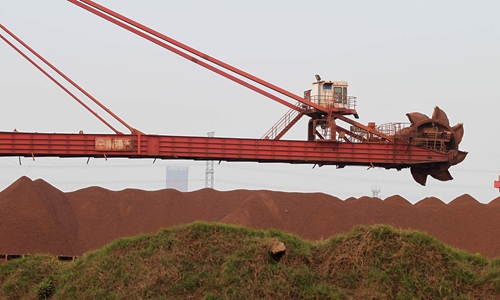HOME >> BUSINESS
China launches iron ore and other options to back commodity trade
By Xie Jun and Qi Xijia Source:Global Times Published: 2019/11/25 22:58:40
Expansion of derivatives range boosts China’s pricing abilities

Cranes load iron ore at a port in Nantong, East China's Jiangsu Province. File photo: VCG
China has just given the long-awaited green light to the trading of new commodity options including iron ore and rapeseed meal, part of a move to enrich the domestic derivatives market to supplement the nation's expanding commodity trade, experts said on Monday.
The enrichment of hedging tools like options and futures will pave the way for China to play a more decisive role in pricing commodities, they said.
The Dalian Commodity Exchange (DCE) received permission from the China Securities Regulatory Commission (CSRC) to launch iron ore options, according to a statement by the CSRC on its official website on Friday.
On the same day, the CSRC also permitted trading of methyl alcohol and rapeseed meal options on the Zhengzhou Commodity Exchange, and trading of gold options on the Shanghai Futures Exchange.
This means that China might have a chance to challenge some of the traditional options trading markets such as Singapore, where the bulk of global iron ore options are traded. The policy also gives enterprises access to more risk-hedging tools in their commodity trading.
"Most of China's iron ore options were traded over the counter in the past. But because of extreme volatility in iron ore prices this year, enterprises need officially launched derivatives apart from the traditional futures contracts as risk-hedging methods," Liu Wensheng, deputy director of the ferrous metal department at First Futures, told the Global Times on Monday.
Xi Junyang, a professor at the Shanghai University of Finance and Economics, said that China's previous worries about the side effects of options trading, such as speculation, have eased a lot as the country's financial markets matured in recent years.
"China needs a financial market with higher international status and one that can better support its burgeoning real economy. Both raise the requirements for China to enrich its financial derivatives in line with international practice," Xi told the Global Times.
China launched sugar options in 2017 and copper options in 2018.
Global participation
The development of the nation's derivatives market, including the gradual rollout of commodity options and the opening of commodity futures to overseas investors, would encourage global participation in China's commodity trade and enhance China's role in commodity pricing, experts said.
The DCE stressed in one of its recent reports that launching iron ore options would push the building of an iron ore international pricing center in China.
A virtuous circle has already emerged, seemingly, in which the balance of some commodities' pricing - like iron ore - has started to tilt toward China as a result of burgeoning market demand and the enrichment of financial tools.
According to the DCE statement, more than 170 offshore clients from 15 countries and regions have traded DCE's iron ore futures since those contracts were opened to offshore investors in May 2018.
On November 14, Brazilian miner Vale SA signed a physical iron ore spot deal to supply a Shandong Province-based steel company using the iron ore futures price from the DCE, the first time that an overseas miner has used a Chinese iron ore futures contract for a spot trade.
Vale's deal came just weeks after London-based iron ore miner Rio Tinto signed its first yuan-denominated iron ore spot trading contract. Both are examples of the gradual shift of iron ore pricing from overseas markets to China, experts said.
"As more overseas traders come to China for commodity trading, and more of them get familiar with China's market mechanisms, China can become a pricing center," Li Qiang, director of the research center under Xinhu Futures, told the Global Times on Monday, adding that a rich variety of futures tools will enable China to have better say in commodities pricing.
"Of course, it might be difficult for China to completely replace overseas mature markets in some of the traditional commodities like crude and agricultural products. That's why China must enhance pricing on some of its 'specialty products' like pulp and glass by perfecting the corresponding derivatives," Li said.
China is also playing a more important role in pricing with its burgeoning market demand, experts said. The largest iron ore importer in the world imported 1.064 billion tons of iron ore in 2018, according to customs data released in January.
Newspaper headline: New options for commodity users